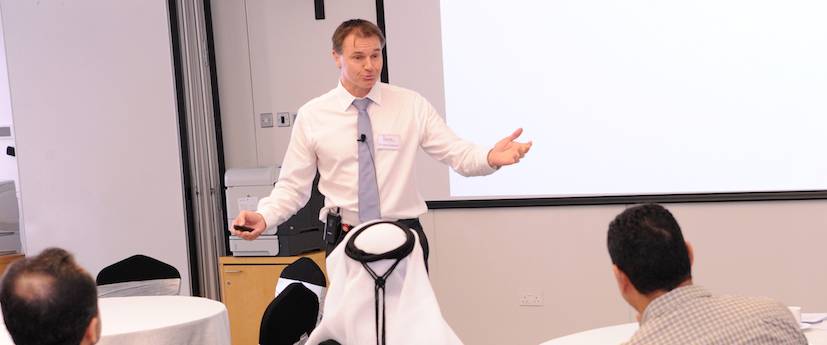WCM-Q workshop trains doctors to break bad news well
 The workshop was directed by Dr. Liam Fernyhough, assistant professor of medicine at WCM-Q.
The workshop was directed by Dr. Liam Fernyhough, assistant professor of medicine at WCM-Q.
A training program to help doctors break bad news to patients in a sensitive and constructive manner was held at Weill Cornell Medicine-Qatar in collaboration with the Qatar Cancer Society.
The Breaking Bad News Workshop offered a full day of training exercises, role play sessions, and discussions to physicians from the Primary Health Care Corporation (PHCC) to share the latest best practice on communicating difficult diagnoses to patients.
Dr. Liam Fernyhough, assistant professor of medicine, course director for the event, explained the importance of breaking bad news well. He said: “The breaking of bad news can be a difficult part of any doctor-patient encounter. Communication skills like this can be learned and practiced so that a discussion of bad news can give patients an accurate understanding of their diagnosis whilst minimizing the stress and emotional pain of the moment as far as possible.”
In the workshop Dr. Fernyhough introduced the 24 doctors to the SPIKES protocol, designed to help doctors deliver bad news both sensitively and accurately. Research has shown that SPIKES, which stands for Setting; Patient perception; Invitation for information; Knowledge; Explore emotions and empathize; and Strategy and summary, gives doctors and medical students greater confidence in their ability to share difficult news with patients.
The protocol advises doctors to provide a quiet location with no distractions, discover how much a patient understands about their situation, and assess how much information should be provided in the consultation and how much left for future meetings. The SPIKES protocol also recommends that doctors should avoid using specialist medical terms and should observe verbal and non-verbal cues to discern the patient’s emotional state, offering empathy when appropriate. Doctors should conclude interactions by giving a summary and discussing future plans to show patients what the path ahead looks like.

The event featured a presentation by Dr. Mohamud Verjee, associate professor of family medicine in clinical medicine, who described a narrative involving patients, physicians and a need to break some bad news, while Dr. Alan Weber, visiting professor of English, spoke about the positive effects of good patient-doctor communication and the evidence behind good communication outcomes. Dr. Stella Major, associate professor of family medicine in clinical medicine, then described how best to engage with the role play sessions, in which the participants practiced breaking bad news to actors playing the roles of patients. Dr. Amal Khidir, associate professor of pediatrics, also facilitated the event.
The event was accredited locally by the Qatar Council for Healthcare Practitioners-Accreditation Department (QCHP-AD) and internationally by the Accreditation Council for Continuing Medical Education (ACCME).